We are trying our best to keep you informed of everything there is to know about GST. In this attempt, today, we are going to discuss the GST compliance rating system, meaning, need, process, benefits and more.
Ever since the Goods & Services tax (GST) system has been introduced in India, new terms keep emerging that are confusing the taxpayers. There are many GST concepts that people are getting familiar with as we move further towards the acceptance of this new tax system.
Contents
What is GST Compliance Rating?
The GST compliance rating means the score given by the government to a registered taxpayer based on their tax compliance status.
The score assigned to each individual or business depends on their compliance with GST rules of tax filing process, due dates, input credits and information provided by them at the time of registration and filing. The eligibility of a business to get tax refunds will be determined by their compliance score.
The GST compliance rating score of a GST taxpayer is visible to all other businesses. It does not depend on the size, nature, or turnover of the business.
Following are the factors affecting the GST compliance rating of a business.
- Punctuality in filing return
- Punctuality in paying taxes
- Punctuality in uploading tax invoices on GST Portal
- Providing correct details for claiming or use of input credit
- Compliance with other GST rules and regulation, and
- Cooperation with GST officials
The compliance rating of a business will go up or down based on their compliance or non-compliance with the above GST rules and procedures.
Need for GST Compliance Rating System
The rating system was introduced with the aim to make people more GST compliant through attractive tax refund benefits. Normally, a taxpayer gets refunds of his/her input credit only when the other party (supplier) has provided and confirmed his details in GSTR-1 Form, which often results in a delayed payment of input tax credit if certain businesses delay in filing their returns and paying taxes.
The rating system, however, protects the GST compliant taxpayers by providing them an immediate refund of their credits depending on their compliance score. Check out some other benefits below.
Benefits of the GST Compliant Rating System
- Immediate tax refunds
- Immediate refund of input tax credit
- Improved business trust and reputation
- Buyers will be able to choose the sellers with higher compliance rating so that they can get faster credits on input tax.
- Higher GST rating means more customers and business
- Fewer chances of getting audited by GST authorities
- Less or no scrutiny
The rating system is expected to compel businesses to be more GST complaint to get more business and compete effectively with other businesses.
Disadvantages of GST Compliance Rating System
The disadvantage of the rating system is that the businesses will be nearly forced to be compliant if they wish to maintain their reputation in the market. This will affect the capability of the small businesses who do not have sufficient resources to file GST returns on time which will make it harder to be fully compliant, especially in the beginning days of GST.
Another disadvantage is that the compliance rating of a buyer will also be affected by the GST compliance of the seller since the GSTR-2 return of the buyer will not be considered complete unless his seller verifies the information in his GSTR-1 Form.
How does it work?
Under the GST compliance rating scheme, a business will be paid the refund in percentage on the basis of their compliance rating. For example, if a business has 6 GST rating, it shall be paid 60% of his pending refunds immediately when he applies for a refund. Similarly, a taxpayer with even higher rating will get more of his refund.
Only a GST compliant taxpayer with a rating of 5 or more will get the benefits of this scheme. A registered person/business will be given GST rating based on the various GST compliant factors mentioned above.
How to check your compliance rating?
All the GST registered businesses will be notified of their compliance ratings regularly. The compliance score will be updated periodically at specific intervals and will be accessible online. Everyone can view this score, and small businesses can use this to identify and choose the most GST-compliant suppliers.
How to Maintain GST Compliance Score
The only way to maintain your compliance rating is to follow the rules and regulations of GST, file monthly returns on time, pay taxes on time, behave properly with authorities and submit annual tax returns on time.
Business should include the correct details of sales and purchases in their GSTR-1 and GSTR-2 returns. They should avoid making any delay in submission of taxes, as it not only levies penalty but also affects your GST score. Businesses with tax dues are not allowed to file their next return until the dues are paid.






